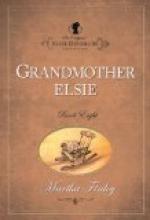“You have no idea, my dear sir,” the captain one day remarked to his host, “how delightful it is to a man who has passed most of his life on shipboard, away from women and children, to be taken into such a family circle as this! I think you who live in it a highly favored man, sir!”
“I quite agree with you,” Mr. Dinsmore said “I think we are an exceptionally happy family, though not exempt from the trials incident to life in this world of sin and sorrow.”
“Your daughter is an admirable mother,” the captain went on, “so gentle and affectionate, and yet so firm; her children show by their behavior that their training has been very nearly ii not quite faultless. And in seeing so much of them I realize as never before the hardship of the constant separation from my own which my profession entails, as I ask myself, ’If I were with them thus day after day, should I find them as obedient, docile, and intelligent as these little ones? Will my Max be as fine a lad as Harold or Herbert? Can I hope to see Lulu and Gracie growing up into such lovely maidenhood as that of Miss Violet?”
“I sincerely hope you may be so blessed, captain,” Mr. Dinsmore said, “but much will depend upon the training to which they are subjected. There is truth in the old proverb, ‘Just as the twig is bent the tree’s inclined.’”
“Yes, sir; and a higher authority says, ’Train up a child in the way he should go, and when he is old he will not depart from it.’ But my difficulty is that I can neither train them myself, nor see that the work is rightly done by others.”
“That is sad, indeed,” Mr. Dinsmore replied with sincere sympathy. “But, my dear sir, is there not strong consolation in the thought that you can pray for them, and that ’the effectual fervent prayer of a righteous man availeth much’?”
“There is indeed, sir!” the captain said with emotion. “And also in the promise, ’I will establish my covenant between me and thee, and thy seed after thee in their generations, for an everlasting covenant, to be a God unto thee, and to thy seed after thee.’”
CHAPTER X.
“One Pinch, hungry, leanfac’d
villain.”
—Shake.
Captain Raymond’s two little daughters were at this time in a village in one of the Northern States, in charge of Mrs. Beulah Scrimp, a distant relative on the mother’s side.
Mrs. Scrimp was a widow living in rather genteel style in a house and upon means left her by her late husband. She was a managing woman, fond of money; therefore glad of the increase to her income yielded by the liberal sum Captain Raymond had offered her as compensation for the board and care of his motherless little girls.
She had undertaken Max also at first, but given him up as beyond her control; and now, though continuing to attend school in the town, he boarded with the Rev. Thomas Fox, who lived upon its outskirts.




